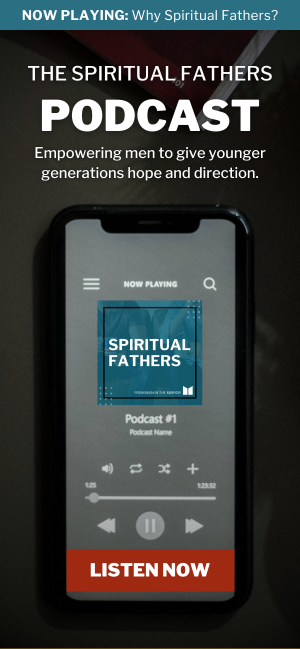Soul Care (Part 3 of 3)
“Burnout is real and SOUL burnout is devastating. But recovery is equally real, and the Doctor is waiting.” This week, real pastors talk about soul care, sharing what keeps their souls refreshed and steady in the mission to which they’ve been called.

By the Man in the Mirror Team
Out of my distress I called on the LORD; the Lord answered me and set me free.
The Lord is on my side; I will not fear. What can man do to me?
Psalm 118:5-6, ESV
Roger, a longtime pastor in a large church, shared:
I’ve always been a competitive person. Some of that serves the kingdom well as healthy motivation, but way too much boils inside as anger that does not come from the King. I’m sneaky in that I tend to hide my anger behind a calm, quiet, evangelical niceness. I don’t let it boil over, but I keep the pot simmering on a back corner of the stove, just in case. One of my outlets has been running. On some of my long runs, I have had imaginary, scathing, courtroom cross-examinations that leave my adversaries simpering for mercy. I expose their obvious contradictions and dismantle every one of their false premises. I win every time!
But in the real world, the paper cuts just keep adding up, with salt rubbed into those cuts every day by the sickness of our culture and brokenness I see. This simmering pot of anger can so easily dominate my thoughts and my perspective, draining my energy like an app running in the background on my computer.
Recently I confessed to a men’s group I lead that I had been carrying a low-grade fever of crabbiness, frustration, and inner argumentativeness. I was talking back to the radio and TV. I was amassing evidence for my view of things, and wishing I had someone to yell at to convince the world to align itself with my brilliant solutions.
Finally, I remembered that anger is a secondary emotion. It arises as a defense mechanism to protect us from intrusion, injury, and attack. Anger can rise up to guard what is valuable, and when used properly, it provides a God-given energy to give courage and cause action in the face of threat.
But when I asked myself: What lies beneath my anger? Where does the anger come from? the answer came to me clearly: fear.
I had to admit and confess to God, that I had allowed my spirit to become a holding pond for all the toxic run-off from the world. I harbored concerns about all kinds of things, from my 401k to the trajectory of the food supply chain. I was worried about everything from the burgeoning national debt to the paralysis of the economy. I stewed about the future viability of the churches.
Fear has many offspring, and it seemed like all the distant cousins had come for a family reunion in my backyard. I wasn’t paralyzed in panic or losing sleep. I was not experiencing quaking knees or sweaty palms. It just felt ominous, like a distant thunderstorm. I felt surrounded by issues I couldn’t directly solve or even address.
Then the Lord gave me two verses that have been an anchor for my soul: “Out of my distress I called on the LORD; the Lord answered me and set me free. The Lord is on my side; I will not fear. What can man do to me?” (Psalm 118:5-6)
Two things happened when I immersed myself in these truths: 1) I confessed my pride for thinking that I was here to solve the problems of the world, and 2) I realized that fear—once named and outed—loses its power under the strong hand of the Lord, who alone is our Savior.
I recognized that I needed to take a step back and care for my soul. I had to lighten my load by examining the weights I had accumulated and calling on the Lord for help. Only then could I really say with confidence: “What can man do to me?”
Do you sense that, like Roger, you need to take a step back and lighten your load? In part one of this series, we talked about why a commitment to “Soul Care” is so crucial to the well-being of our leaders and the church as a whole. Last week, in part two, we shared four warning signs that you may be headed for burnout so you can do a course correction, with God’s help.
This week, in our conclusion of the Soul Care series, we are hearing from real pastors about what brings them refreshment and keeps them steady in the mission to which they’ve been called.
Abiding in Him
When it comes to spiritual health and leading in ministry, every pastor we spoke to identified one thing above all else, for which there is no substitute: spending time personally with God.
As leaders in ministry, it’s easy to fall into a trap where we can go about our day or week without noticing we haven’t prioritized this. After all, we may have prepared sermons or classes, practiced worship songs to sing in service, counseled other Christians, carved out a plan for starting small groups, led prayer meetings—we may feel we’ve talked about the things of God nonstop!
But talking about God is very different than talking with God. Only one truly nourishes our soul and fills us up to be able to pour out.
Greg, who candidly shared his story of spiritual burnout in last week’s post, has learned lessons since that have not only been lifesaving, but life-giving. “I have discovered that the nurturing of the soul must be my priority. Starving the soul leads to death,” Greg said. “For me, nurturing my soul is practicing the art of relinquishment by abiding in Christ. It removes my need to perform or control anything except my own attitudes and actions.
“Soul recovery from burnout is a proportional process, you see. But the more we abide, the more transformation we experience. I learned it’s only possible to abide in Christ to the level of my deepest, darkest secret held—it’s critical to live a 100% confessional life. No 24-hour day expires for me now without confession.”
For Dave, a few time-tested practices help him get the most out of his time. “I try to make it a priority every day—before I do anything related to ministry—to get into the Word of God and to pray. A huge help has been journaling as I read. That discipline helps me think more deeply and clearly. Writing just a small page a day crystallizes my thoughts of what the Lord may be saying to me. It also makes it easier to remember what I have been reading, as well as provides a record that I can look back on.
“Scripture memorization is another tool that helps me,” he added. “It’s hard work, but it pays big dividends. God’s Word, when memorized and meditated on, washes my mind so that I am able to think in a way that is more aligned with Him.”
This year, when it seems every week there’s a new crisis or challenge to face, this “washing of the mind” has become more critical than ever. We are under a constant barrage of bad news, opposing opinions, and pressures—and pastors feel this even more acutely as others look to them for clarity and direction.
Andy shared, “I have been constantly reminded that my personal spiritual disciplines are absolutely vital, stable pillars for my mental and spiritual health. They are things that can stay stably in place when all else is shaking. When it comes to my sense of rest, motivation, and internal well-being, so much of my day either rises or falls on these special anchors.
“Through these spiritual disciplines, which I adhere to rigidly, I meet God, and I am steadied through them in these unprecedented times, clinging to Jesus.”
THE BIG IDEA: Are you more committed to talking about God or talking with God? Only one truly nourishes your soul and fills you up to be able to pour out.
Relaxing Your Grip
As a young pastor coming to the end of himself, Ronn was at a crossroads. He felt like Elijah after his victory at Mt. Carmel, facing Jezebel’s threat. And like Elijah, he’d isolated himself—he’d run and hid in a proverbial cave.
“God asked Elijah the simple question we all need to hear when we isolate in our cave: ‘What are YOU doing here?’” Ronn told us. “Then God did three things for Elijah: He met his physical needs (food, rest, exercise); He spoke truth (you’re not the only one; seven thousand have not bowed to Baal); and He gave him a companion, Elisha.”
Ronn took this message to heart and started re-evaluating his life and ministry. “The physical needs part was fairly simple,” he said. “I started eating better, started exercising again, and took a much-needed vacation.”
Other pastors echoed this—how taking care of themselves physically helped them feel more fit spiritually. Dave shared, “I have found great help in getting out very early in the morning and taking a long walk. It clears my mind and exercises my body, increasing my energy level throughout the day. And as I walk, I’m refreshed by God’s creation all around me.”
The second part of Elijah’s story that resonated with Ronn was the need to hear and listen to truth. “Several people, and God, were trying to speak truth to me at that time—including my wife!” Ronn recalled.
“She used a not-so-subtle metaphor to show that I had allowed our church and all that it involved to become my mistress, and she was not going to allow that anymore. What had led to that was the belief that ‘I’ was the one who had to make sure everything kept going and growing. I had perfected the Elijah whine of ‘I only am left.’”
Ronn found that when he relaxed his grip on the church, he experienced the same sense of freedom that Roger found when he lightened his load. God proved trustworthy for both men, able to handle their burdens.
“In my experience,” Dave told us, “those struggling with burnout tend to be too serious about everything, including themselves. Learn to have a good laugh, especially at yourself. As John Maxwell says, ‘We take ourselves way too seriously, and we don’t take God seriously enough.’”
“God’s Kingdom will survive with or without you. He didn’t choose you because He couldn’t get by without you. He chose you because He loved you and wants to make His power known through your weakness.”Click To TweetGreg echoed this sentiment—and the importance of resisting the urge to pack our schedules. “I realize now that it’s okay to give myself permission to create space in my life. If chaos is present, my schedule is out of order. And if I have no margin, I have no joy.”
It’s a struggle to reject the idol of busyness in a culture that is always demanding more and more. If we aren’t careful, we can give in to the temptation to equate our value with how many people are depending on us. But Jesus had a much different model in mind in Matthew 11:28-30:
“Come to me, all who labor and are heavy laden, and I will give you rest. Take my yoke upon you, and learn from me, for I am gentle and lowly in heart, and you will find rest for your souls. For my yoke is easy, and my burden is light.”
Prayerfully consider these questions this week: Where do you find rest? What makes you feel alive? Is there something you need to relax your grip on? Is there counsel you haven’t heeded? Which burdens do you need to give to God?
Finding Foxhole Friends
The third part of Elijah’s story that struck a chord with Ronn was Elijah’s need for an Elisha. Too many pastors are without a “foxhole friend” that they could pick up the phone and call at 2:00 in the morning.
“As men, we tend to isolate,” Ronn said. “And as men in the ministry, we are even more prone to isolate; after all, to whom can we go? When do we get to unload? Your wife may be tired of hearing the complaints and quite possibly your elders and/or staff are part of the problem. For me, when a young man came to me for mentoring, we started walking through what ministry was and developed a friendship. Along the way, I encouraged him, but not nearly as much as he encouraged me!”
The pastors we spoke to who have come back from a burnout or avoided one altogether have been deliberate about putting others around them for support.
Andy shared, “I have a group of pastors that I have a high level of vulnerability with, as well as some friends who I have stayed continually connected to.”
Likewise, Dave told us, “I have several men in my life that I can turn to when needed. One man in particular doesn’t live near me, but we do a ZOOM call every week to catch up on life, talk through issues, and pray. One of my biggest blessings, which I did not have earlier in my life, are male friendships. No man or pastor should be without them.”
At Man in the Mirror, we have seen firsthand the devastation that can come when the enemy finds just that: a man or pastor without close male friendships.
One former pastor, Blaine, had been working as a paramedic when he fell into the role of bi-vocational country preacher. Unfortunately, a few years in, through a series of bad decisions and under the stress of both jobs, he also fell into an extramarital affair.
He remembers that during the time leading up to it, he was at one of his kid’s soccer games when another pastor approached him and invited him to join a regular, informal gathering of area pastors. “Well, thank you, I’ll see if I can,” he told him, all the while thinking, Why would I want to get together to talk with a group of guys? Blaine recalled: “That sealed my fate right then and there.”
This is why our team is committed to a three-fold mission—serving pastors, equipping leaders, and transforming men—that has supporting pastors at the forefront. As you prioritize the practice of regular soul care, we want to make sure you have the support you need. Find a local Man in the Mirror Area Director or feel free to call our offices directly if there isn’t yet an Area Director serving your community.
We hope this Soul Care series has been an encouragement to you—and that through abiding in Him, relaxing your grip, and finding foxhole friends, you will run this race with joy and freedom.
And if you are in a season of struggle or crisis right now, we’ll leave you with Greg’s words as someone who has made it to the other side: “Burnout is real, and soul burnout is devastating. But recovery is equally real. It will require humility, personal honesty, and a permission slip to take all the time necessary and God-appointed resources to become whole. But I guarantee you, it will be worth the investment, and the Doctor is waiting for you.”







Thank you for this. I needed this today. I have been struggling much lately and not sure where to turn. I have a group of men I meet with but when we talk one of my best friends tells his wife and she calls my wife and tells her what I said. It’s hard to find a friend I can trust not to talk to my wife about things that should be kept between men.
We are glad it encouraged you, Ken! It sounds like it might be time for your men’s group to establish some rules and boundaries for the group, including confidentiality.